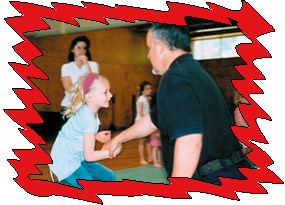 |
   |
|
A Resource for Athens Area Families
|
|
Here are the cold hard facts, in Georgia: 1 murder occurs every 16.8 hours; 1 aggravated assault every 84 minutes; 1 violent crime every 15 minutes; 1 property crime every 1.7 minutes; 1 fatality every 5.7 hours and 1 injury every 4 minutes. In 2005, 35% of violent crimes were perpetrated against people between the ages of 12‑19. These statistics, while sobering, do not take into account cases of molestation, abduction, Internet predators or school bullying. Recent high profile abductions, like those of Shawn Devlin and Ben Ownby, which fortunately had good outcomes, provide the perfect opportunity to talk to your children. With knowledge comes confidence and that brings your child one step closer to being safe. Here are some helpful hints from Child Protection Education of America to help teach children how to be safe: Your kids need to know how to protect themselves, at the same time you don't want to make them fearful of everyone or anxious about being kidnapped or murdered. Explain that most people care about kids and want to help and protect them - but there are some adults who try to kidnap or hurt children. Tell them learning what to do is like a fire drill - they'll probably never need to do it in real life but it's important for them to know what to do, just in case. Let them know it's okay to say "No" if the situation doesn't feel right. We all want our children to respect adults, but some kids have been abducted or murdered because they were "good" children who obeyed adults when they should have said "no," screamed or fought back. Make it fun; have your child take part in the learning process. Play "What if?" Give children a chance to practice what they have learned. What if a policeman said your mother was sick and you should go to the hospital? What if your babysitter tickled you a lot and you didn't like it? Use your imagination. You can also role play the part of a person trying to trick them - predators will often play games or use bribery to trick children. Do this repeatedly - children need constant reminders. Something that almost every child will come in contact with at some time in their lives is bullying. According to Dr. Pamela Orpinas, University of Georgia Professor of Health Promotion and Human Behavior, there are two basic types of bullying. Dangerous bullying, acts for which adults would be prosecuted and put the victim's life at risk, and annoying bullying, aggressive behaviors (physical, verbal, relational) that can range from innocuous to cruel. "If the bullying is dangerous, they need to ask for help immediately," says Dr. Orpinas. "If the bullying is annoying, they can try several strategies to make it stop, like being nonchalant, strengthening relationships with other students, keeping a journal of the behaviors to later share with the counselor or principal, being assertive about asking the behavior to stop, or developing positive comebacks. Being aggressive in retaliation is not a good option." Dr. Orpinas also notes that in the end children need to know that adults in their lives have the responsibility to stop the bullying. As for how self‑defense training can aid in dealing with bullies, University of Georgia Professor of Counseling and Human Development Services Dr. Andy Horne states that, "A number of bully researchers have reported that self‑defense training can be helpful, not to teach children victimized by others to become aggressive themselves, but to give them more self confidence, more understanding of the importance of self‑defense, and better self control skills." There are many self‑defense workshops available to adults and children that help solidify these practices; helping to keep kids safe in any situation. One that is available is the Classic Martial Arts Club Summer Camp, for kids ages 4‑6 and 7‑12. This valuable summer camp teaches kids self‑defense tactics and Internet safety, with visits by Athens‑Clarke police department and role playing in different situations. For more information call 706.353.3616, visit www.classic‑mac.com or email info@classic‑mac.com. Mary Wickwire is the mother of two fabulous girls, two large dogs, one small cat and a turtle; she helps to run Classic City Chef, a local catering business, with her husband Mickey.
|
. |
|
|
|
© 1998 - Athens Parent, Inc. All
rights reserved.
Reproduction in whole or in part without permission is prohibited. |
|
Send comments or suggestions to: webmaster@athensparent.com
|
 I'm the kind of person who likes to look on the bright side of
life; you know the type, a glass half full, happy ending kind of
girl. So when I set out to write this article I wondered
how I could introduce the importance of self‑defense for
children without frightening people - but the truth is it's a scary
world out there and it gets more frightening every day. Then
came the real eye‑opener - I asked my youngest child if she
would take candy from a stranger . . . and she nodded eagerly answering
a resounding "yes!" Talk about a reality check.
I'm the kind of person who likes to look on the bright side of
life; you know the type, a glass half full, happy ending kind of
girl. So when I set out to write this article I wondered
how I could introduce the importance of self‑defense for
children without frightening people - but the truth is it's a scary
world out there and it gets more frightening every day. Then
came the real eye‑opener - I asked my youngest child if she
would take candy from a stranger . . . and she nodded eagerly answering
a resounding "yes!" Talk about a reality check. 
